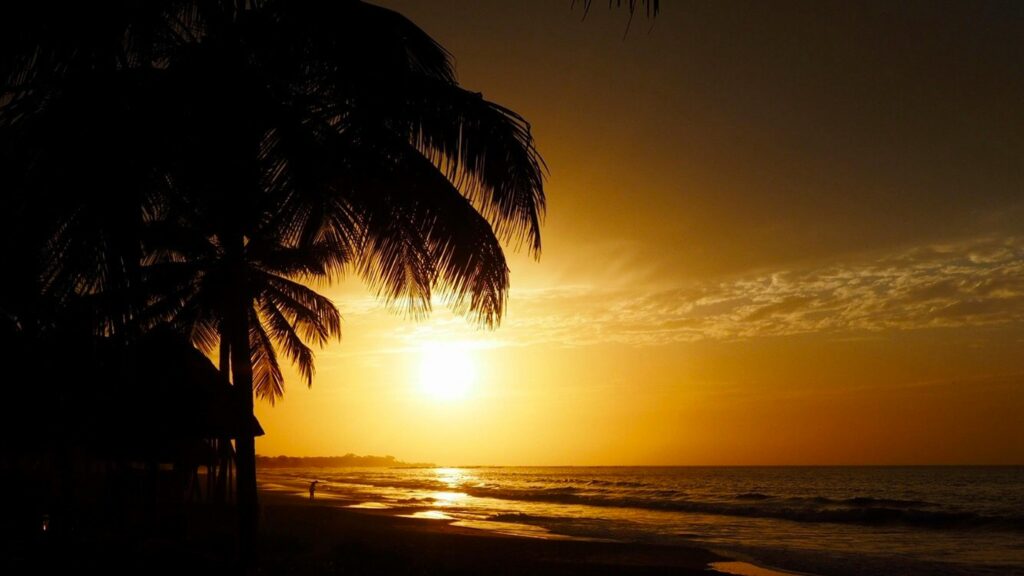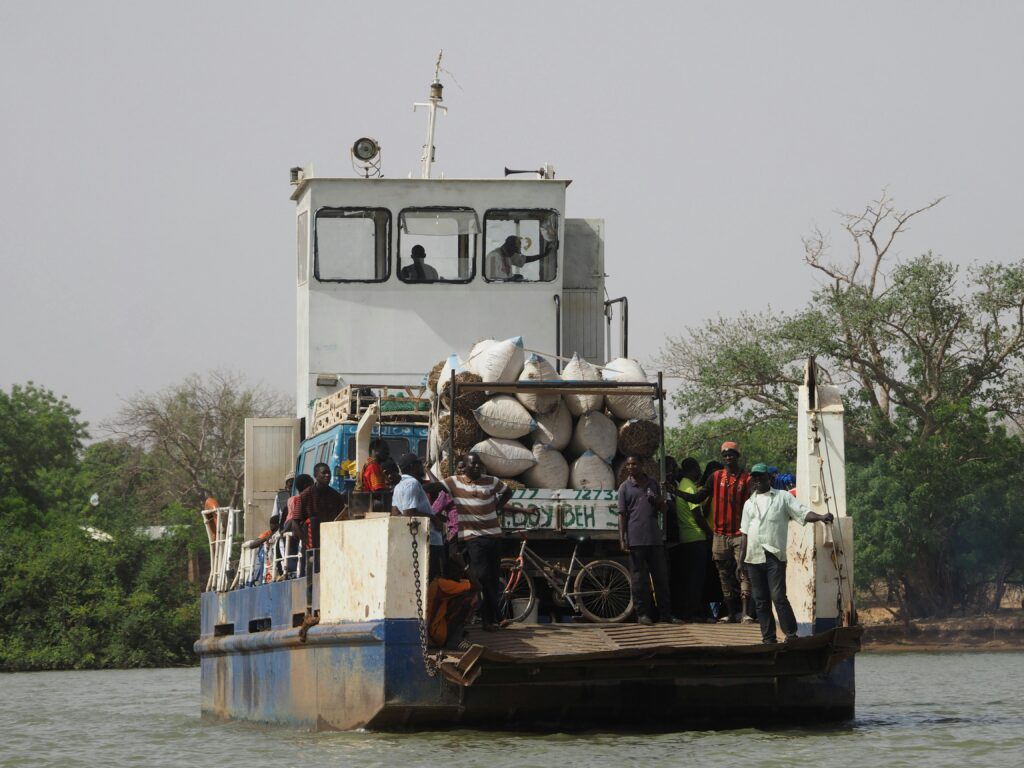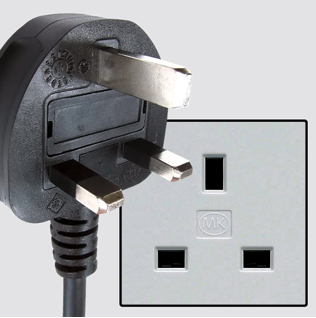Gambia / Republic of The Gambia – Let’s explore here

What’s it like in Gambia?
Gambia is a small, flat country in western Africa that follows the Gambia River all the way to the coast on the Atlantic Ocean. About half the size of Wales, UK, it’s only 30 miles (48 km) or so at its widest point and is the smallest country in Africa. It’s also completely surround by Senegal, apart from at the coast.
The terrain mainly consists of savannah grasslands and mangrove swamps. The highest point is an unnamed sandstone bank, close to Saba, at 210 ft (64m) above sea level.
The population of Gambia is around 2½ million people (2023), about ½ million of who live in the metropolitan area of the capital, Banjul. It has a very rich, interesting and mostly stable history.

A bit about the history of Gambia
Early History and Colonial Era
The history of Gambia dates back to ancient times, with early settlers living along the Gambia River. The region was home to several ethnic groups, including the Mandinka, Fula, and Wolof. In the 15th century, Portuguese explorers arrived, followed by the British and the French, who became involved in the transatlantic slave trade. The Gambia River became a key point for the transport of enslaved Africans, and the British eventually established a trading post in the region. In 1888, Gambia became a British protectorate and, in 1917, a crown colony. The country remained under British colonial rule for much of the 20th century.
Path to Independence
Following World War II, there was growing demand for self rule across African colonies. In 1965, Gambia gained its independence from the United Kingdom, becoming a republic with Dawda Jawara as its first president. Jawara’s government established a stable democracy, although it faced challenges from political and economic instability in the region.
The Jawara Era
President Dawda Jawara led Gambia for nearly three decades. He was initially elected in 1965, after the country gained independence, and was re-elected in 1972 and 1977. Under Jawara’s leadership, Gambia was a multi party democracy. However, his government struggled with economic issues, and political opposition began to grow. Jawara also faced regional instability, particularly due to conflicts in neighbouring countries like Guinea-Bissau.
Military Coup and the Jammeh Regime
In July 1994, a military coup led by Yahya Jammeh ousted President Dawda Jawara. Jammeh, a young military officer, took control of the country and declared himself president. Initially, Jammeh promised to restore democracy, but he later established an increasingly authoritarian regime. Over the next two decades, Jammeh ruled with a strong grip, suppressing political opposition, limiting press freedom, and using state resources to maintain power. His government was criticised for widespread human rights abuses, including the detention and torture of opposition members, as well as the execution of several political prisoners.
The 2016 Election and Jammeh’s Departure
In December 2016, President Jammeh faced a challenge from opposition candidate Adama Barrow in the presidential election. In a surprising turn of events, Jammeh lost the election. However, after initially conceding defeat, he rejected the results and refused to step down, claiming electoral fraud. This led to a political crisis and the threat of civil unrest. In January 2017, after months of tense negotiations and pressure from the international community, Jammeh was forced to leave Gambia and go into exile in Equatorial Guinea. Adama Barrow was sworn in as president in January 2017, marking a peaceful transition of power after more than two decades of Jammeh’s rule.
Post-Jammeh Era and Democratic Reforms
Following his departure, Gambia entered a new era of democratic transition under President Adama Barrow. Barrow’s administration focused on rebuilding the country’s democratic institutions, improving human rights, and tackling the economic challenges inherited from Jammeh’s rule. The country embarked on reforms aimed at strengthening the rule of law and ensuring accountability for past human rights abuses. A Truth, Reconciliation and Reparations Commission (TRRC) was set up to investigate the crimes committed during Jammeh’s regime, and several high ranking officials were charged with various abuses.
Challenges and Political Stability
Since Barrow’s election, Gambia has faced significant challenges, including poverty, unemployment and regional tensions. Despite these challenges, Gambia has made progress towards political stability, with free elections and greater freedom of speech. In 2021, Barrow won a second term in a contested election, further solidifying his position as the country’s leader. The TRRC continued its work into the early 2020s, with various recommendations for justice and accountability, though some have raised concerns about the pace of reform and the effectiveness of transitional justice.
Gambia’s Current Outlook
As of 2025, Gambia is still in the process of consolidating its democracy and addressing the legacy of Yahya Jammeh’s authoritarian rule. Although there have been significant improvements in political freedom and human rights, the country faces ongoing challenges in terms of economic development and poverty alleviation. Gambia’s future remains dependent on its ability to strengthen democratic institutions, promote economic growth, and deal with the political and social tensions that persist in the post-Jammeh era.

Gambia road trip
Our Gambian road trip is part of a much larger African road trip.
Our current planned Gambian road trip takes us from Senegal through Gambia, then back through Senegal towards Guinea-Bissau. No doubt we’ll explore the country much more than this continent-spanning short route shows, in particular checking out the capital and inland Gambia.
Hopefully our journey will improve our knowledge of this intriguing and beautiful country, and enable us to meet some interesting people. We’ll be updating this page at that time – don’t forget to check back 🙂

What’s it like to drive in Gambia?
They drive on the right hand side of the road in Gambia. In the main, roads are quite good, although some minor roads are unsurfaced dirt tracks. Driving standards are poor however.
Do you require an international driving permit in Gambia?
We’ve created a dedicated page to driving abroad, which answers this question, and more, which you might find helpful.
Can you use your UK driving license when driving through Gambia?
We’ve created a dedicated page to driving abroad, which answers this question, and more, which you might find helpful.
Do I need a carnet de passages to drive in Gambia?
A Carnet de Passages is required to overland in Gambia. We’ve created a dedicated page to driving abroad, which answers this question, and more, which you might find helpful.
What currency do they use in Gambia?
In Gambia they use the Dalasi. Cash is widely used. The use of credit / debit cards is not widely accepted; although Visa debit cards are becoming more widespread. Travellers cheques are not generally accepted. There are few ATMs outside of tourist areas.
You should make yourself aware of the amount that your bank charges you for using credit and debit cards abroad. Often credit cards are cheaper for purchasing items directly, and for withdrawing cash from ATMs.
What language do they speak in Gambia?
They mainly speak Mandingo, Fula and Wolof in Gambia, although English is also widely spoken, and is the official language.
What time zone is Gambia in?
Remember, when you’re planning your next trip to take a look at what time zone it’s in.
Do I need a visa to visit Gambia?
We’ve created a dedicated, more comprehensive page on visas, which you should find helpful. Check it out!
Is wild camping legal in Gambia?
Yes, wild camping is fine in Gambia.
What plug / socket type do they use in Gambia?

In Gambia they use plug / socket type G.
Health issues in Gambia
Is it safe to drink water in Gambia?
No, it is not safe to drink tap water in Gambia. Bottled water is readily available throughout the country.
What vaccinations are required for Gambia?
This NHS website is kept up to date with all relevant information on vaccinations in Gambia.
Phones in Gambia
What is the country calling code for Gambia?
The country calling code for Gambia is +220
What are the emergency phone numbers in Gambia?
- The emergency number for police in Gambia is: 112 / 117
- In Gambia, the emergency number for ambulance is: 116
- The emergency number for fire in Gambia is: 118
If you’ve got some awesome pictures, or some useful info that you’d like to share, let us know!
And don’t forget to check out all the other pictures!
